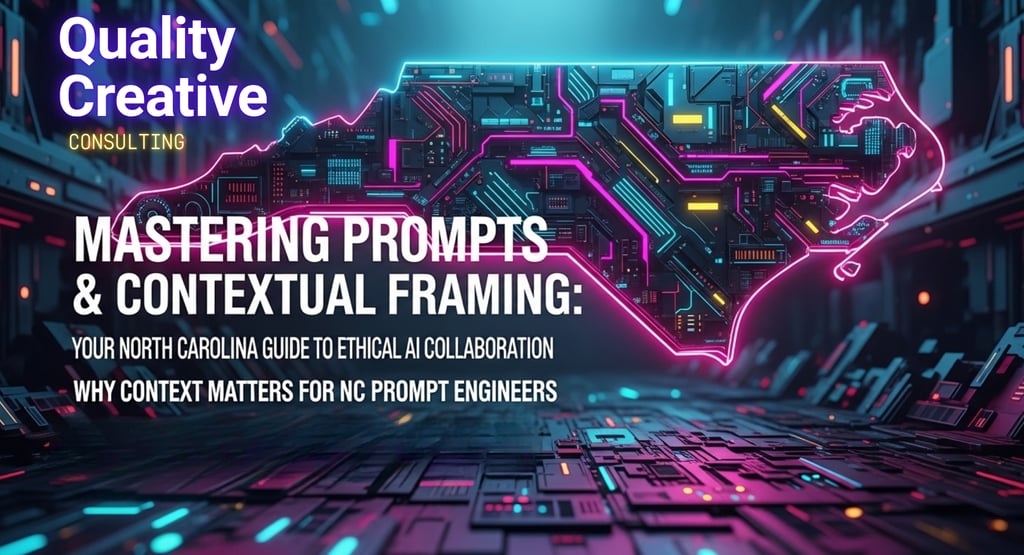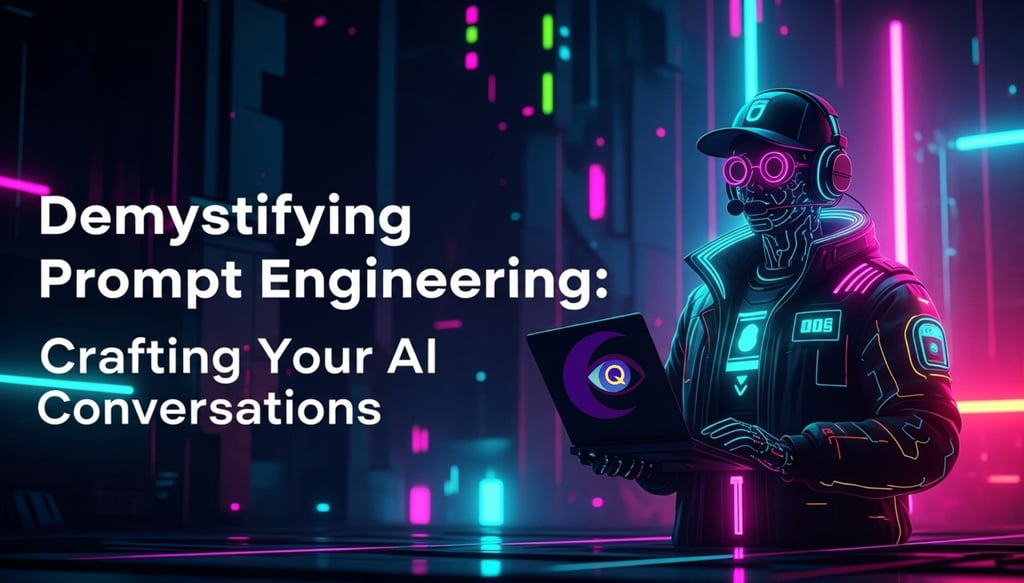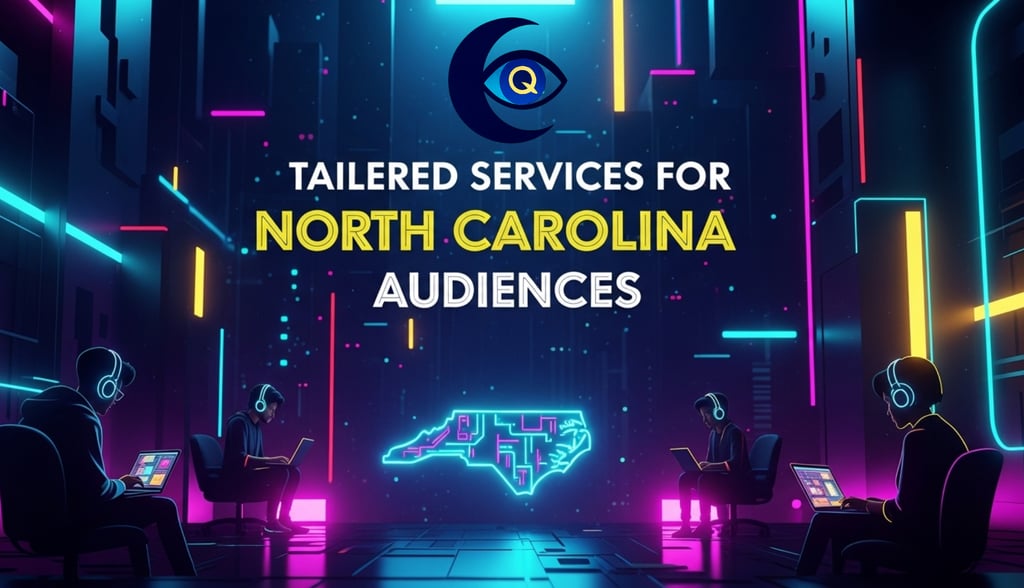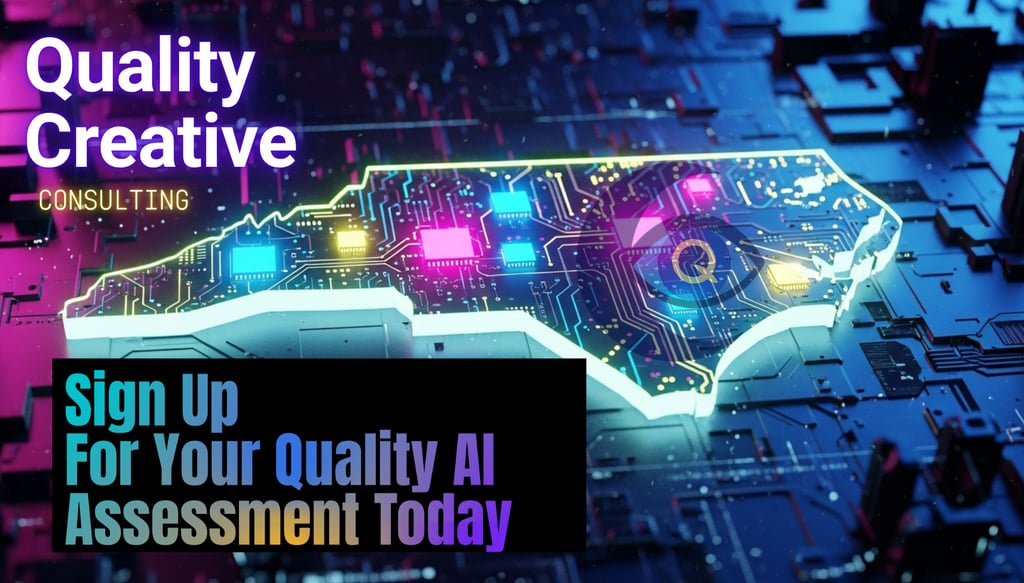Mastering Contextual Framing in Prompt Engineering for NC Businesses and Educators
Why Context Matters for NC Prompt Engineers: Your North Carolina Guide to Ethical AI Collaboration
Mac Carter
8/9/202512 min read



Why Context Matters: Your North Carolina Guide to Ethical AI Collaboration
In an AI-driven world, context matters, and the ability to communicate effectively with artificial intelligence systems is no longer a niche skill—it's a fundamental literacy.
From automating routine tasks to generating creative content, AI is reshaping industries, education, and daily life across North Carolina.
Let’s be clear: AI is shaping how we think, therefore those who can think critically for themselves and communicate at a high level will determine how AI is most effectively used.
But how do you unlock the true potential of these powerful tools? The answer lies in mastering the art and science of prompt engineering and contextual framing.
Imagine AI as a brilliant, but sometimes literal, assistant. Without clear, precise instructions and adequate background information, even the most advanced AI can produce generic, irrelevant, or even misleading outputs.
This is where prompt writing and contextual framing come into play: they are the keys to transforming your AI interactions from frustrating guesswork into productive, collaborative partnerships.
For North Carolina's diverse sectors—from educators in Raleigh seeking innovative lesson plans to small business owners in Wilmington aiming to streamline operations—these skills are becoming indispensable.
At Quality Creative, we understand that effective AI collaboration goes beyond mere technical proficiency. It's about fostering ethical AI use, empowering communities, and ensuring that human ingenuity remains at the forefront of innovation.
We believe that by mastering the language of AI, you can not only enhance your productivity but also contribute to a more responsible and beneficial AI ecosystem.
Demystifying Prompt Engineering: Crafting Your AI Conversations
Prompt engineering is the process of designing and refining the inputs (prompts) you give to an AI model to get the desired output. Think of it as learning to speak the AI's language.
Just as a well-phrased question elicits a better answer from a human, a well-engineered prompt elicits a superior response from an AI.
It's about clarity, precision, and guiding the AI towards the specific information or creative output you need. The importance of well-crafted prompts cannot be overstated.
Basic principles of writing effective prompts:
Clarity and Specificity: Be unambiguous. Avoid vague terms. Clearly state what you want the AI to do.
Role-Playing: Assign a persona to the AI (e.g., "Act as a seasoned marketing consultant," "You are a high school history teacher"). This helps the AI adopt the appropriate tone and perspective.
Iterative Refinement: Don't expect perfection on the first try. Experiment with different phrasings, add or remove details, and refine your prompts based on the AI's responses. It's a conversation, not a one-time command.
Constraints and Format: Specify the desired output format (e.g., "bullet points," "a short paragraph," "a Markdown table"). Set boundaries on length, style, or content.
For NC educators, a prompt for lesson planning might evolve from "Give me a lesson plan on photosynthesis" to:
“Be my lead research assistant for this chat. Analyze my prompt and research relevant information about my request, then share with me different effective options, including your professional recommendations, and I will in turn give feedback on how to proceed with the lesson plan:”
[Prompt: "As a 7th-grade science teacher in North Carolina, I need a 45-minute lesson plan on photosynthesis. The lesson should include an engaging hook, a brief explanation of the process, an interactive activity suitable for a diverse classroom, and a formative assessment. Please ensure the content aligns with NC Essential Standards for Science and includes a real-world example relevant to North Carolina agriculture."]
For small businesses in North Carolina, a marketing prompt could go from "Write an ad for my coffee shop" to:
“Be my expert social media marketing consultant for this chat who specializes in research and harnessing engagement. Analyze my prompt and research relevant keyword and FAQ information about my request, then share with me a bulleted list of highly effective suggestions, and I will give feedback on how to proceed:”
[Prompt: "As a local coffee shop owner in downtown Raleigh, I need three short social media captions (150 characters each or less) to promote our new seasonal pumpkin spice latte. The tone should be warm and inviting, targeting young professionals and students. Include relevant emojis and a call to action to visit our shop. Emphasize our commitment to locally sourced ingredients."]
These examples demonstrate how a little effort in prompt engineering can significantly elevate the quality and utility of AI-generated content, making it directly applicable to your specific needs and local context.
Beyond the Prompt: The Power of Contextual Framing
While prompt engineering focuses on the direct instruction, contextual framing takes it a step further by providing the AI with the necessary background information, constraints, and examples to truly understand the nuances of your request.
It's about building a rich environment around your prompt that guides the AI's understanding and output quality.
Think of it as giving the AI a comprehensive briefing before it starts its task.
Key Insight: AI engineers building LLMs use a term called “context engineering” which is like prompt engineering, but as mentioned, it is the robust contextual frameworks that allows the language model to parse through requests and reason/think or interpret the input to generate the most optimal output.
Why is context engineering so popular? AI models, despite their vast knowledge, lack real-world experience and common sense. They operate based on the patterns they've learned from data. By providing relevant context, you bridge this gap, helping the AI grasp the implicit assumptions, cultural nuances, and specific requirements of your task. This transforms generic AI responses into highly tailored, useful content that resonates with your audience and aligns with your objectives.
Types of context you can engineer include:
Persona Context: Reinforcing the AI's role or specifying the audience for the output (e.g., "Write this as if you are a local historian for Wilmington, NC," or "Explain this concept to a high school student.").
Format and Structure Context: Beyond simple formatting, this can include examples of desired output structure (e.g., "Follow the structure of a typical academic research paper," or "Organize the information like a press release.").
Tone and Style Context: Guiding the AI on the emotional and stylistic qualities of the output (e.g., "Use a formal, academic tone," "Write in a conversational, friendly style," "Adopt a persuasive and urgent tone.").
Example-Based Context (Few-Shot Learning): Providing a few examples of desired input-output pairs. This is incredibly powerful for teaching the AI a specific pattern or style (e.g., "Here are three examples of successful social media posts for our brand; generate five more in a similar style.").
Constraint Context: Defining what the AI should not do or include (e.g., "Do not use jargon," "Avoid making definitive predictions," "Ensure the content is suitable for a general audience.").
Audience Context: Explicitly stating who the final output is for, which helps the AI tailor its language, complexity, and examples.
Consider how adding context transforms a simple request. If you ask an AI to "Write a business plan," the result will be generic. But with contextual framing:
"You are a business consultant specializing in sustainable agriculture startups in North Carolina. Research and create a concise business plan organized with an executive summary (under 300 words) for a new organic farm in Ashe County, NC, that focuses on farm-to-table produce and agritourism. The summary should highlight our unique selling propositions, market opportunity, and financial projections for the first three years. Emphasize our commitment to environmental stewardship and community engagement. Here is an example of a successful executive summary from a similar NC farm [provide example text]. And here is our current business model that we have been working with so far [provide current business model or plan]."
Rich context allows the AI to generate a highly specific, relevant, and persuasive executive summary that would be impossible with a basic prompt alone. It demonstrates the power of combining prompt engineering training NC with a deep understanding of context.
Strategic LLM Research: Fueling Aggressive, Efficient Prompting
Before you even begin crafting your prompts, a crucial step for maximizing AI utility is strategic research with the LLM itself. Think of the LLM not just as a content generator, but as a powerful research assistant. By leveraging its vast knowledge base to gather and synthesize information, you can then use that data to construct highly targeted, aggressive, and efficient prompts.
This pre-prompting research phase allows you to:
Validate Assumptions: Quickly check facts, definitions, or common understandings related to your topic.
Identify Key Concepts & Terminology: Discover the precise language and concepts an LLM associates with your subject, which you can then feed back into your prompts for better alignment.
Uncover Nuances & Subtleties: Explore different perspectives, historical contexts, or specific details that might not be immediately obvious.
Generate Data Points & Examples: Ask the LLM to provide statistics, case studies, or illustrative examples that you can then use as context or few-shot examples in your main prompt.
Understand LLM Limitations: By testing its knowledge on specific areas, you can identify where the LLM might struggle or hallucinate, allowing you to provide more explicit guidance in your final prompt.
How to Research with an LLM for Aggressive Prompting:
Broad Inquiry: Start with open-ended questions to gauge the LLM's general understanding of a topic. For example, instead of immediately asking for a detailed lesson plan, you might ask: "What are the key pedagogical theories for teaching AI literacy to middle school students?" or "What are the primary challenges small businesses in North Carolina face when adopting new technology?"
Specific Data Extraction: Once you have a general understanding, narrow your focus to extract specific data points. "Provide three recent statistics on AI adoption rates in North Carolina businesses." or "List common ethical dilemmas associated with generative AI in education."
Perspective Gathering: Ask the LLM to present information from different viewpoints. "Describe the arguments for and against using AI in student assessment." or "What are the perspectives of educators, parents, and students on AI in the classroom?"
Format for Re-use: Request the information in a format that is easy to copy and paste into your subsequent prompts. "Summarize the main points in bullet form." or "Provide a list of key terms and their definitions in a JSON format."
Once you have this pre-researched data, you can then use it to construct prompts that are both aggressive (meaning they demand a very specific, high-quality, and detailed output) and efficient (meaning they get to the desired result quickly with minimal back-and-forth).
Aggressive, Efficient Prompting with Research Data:
Instead of relying on the LLM to figure out what you need, you tell it, using the data you've already extracted.
This approach reduces ambiguity and leverages the LLM's processing power more effectively.
For example, if your research revealed key pedagogical theories, you can then aggressively prompt:
"Using the following pedagogical theories [insert bulleted list from research], create a lesson plan for 7th-grade AI literacy. The lesson must incorporate active learning strategies and address the ethical considerations of AI use in the classroom, as outlined here [insert summarized ethical dilemmas]."
This method is highly efficient because you're not asking the LLM to generate information it already knows or to infer your specific needs.
You're providing it with the precise building blocks and clear instructions, allowing it to focus its computational resources on generating the desired output, rather than on preliminary information gathering.
This approach aligns perfectly with QC's emphasis on maximizing the utility of AI tools through intelligent human-AI collaboration.
Ethical AI & E-E-A-T: QC's Guiding Principles for NC
Ethical considerations in prompt and context engineering (formatting) include:
Bias Mitigation: AI models can reflect biases present in their training data. Skilled prompt engineers must be aware of this and actively work to mitigate bias in AI outputs, for example, by specifying diverse perspectives or requesting balanced information.
Misinformation and Hallucinations: AI can sometimes generate factually incorrect information or "hallucinate" details. Context engineering, by providing accurate source material or instructing the AI to cite its sources, can help reduce these occurrences. Critical human review of AI output remains essential.
Responsible Use: Understanding the appropriate and inappropriate uses of AI. For instance, using AI to generate harmful content or to deceive is unethical. QCC emphasizes using AI as a tool for positive impact and human flourishing.
Transparency: Being transparent about when and how AI is used, especially in content creation or decision-making processes.
These particularly ethical considerations are directly linked to the concept of E-E-A-T (Experience, Expertise, Authoritativeness, Trustworthiness), a crucial factor for both human audiences and search engine algorithms, particularly LLMs.
When you use prompt and context engineering effectively, you are not just generating content; you are building a foundation for E-E-A-T:
Experience: By providing AI with specific scenarios or real-world data (context), you can simulate experience, allowing the AI to generate more practical and relevant outputs.
Expertise: Through careful prompting, you can instruct the AI to draw upon its vast knowledge base to demonstrate expertise on a subject, or to adopt the persona of an expert.
Authoritativeness: When AI generates content that is accurate, well-researched, and free from bias (guided by ethical prompt engineering), it contributes to the authoritativeness of your brand.
Trustworthiness: Ethical AI practices, transparency, and the production of high-quality, reliable content foster trust with your audience.
For LLMs like ChatGPT and Perplexity, which are increasingly used for information retrieval and content generation, E-E-A-T is paramount.
Content that demonstrates these qualities is more likely to be cited, ranked higher, and trusted by users.
Our ethical AI training North Carolina programs specifically address how to leverage prompt and contextual framing to enhance E-E-A-T, ensuring your digital presence is both impactful and credible.
Quality Creative Consulting is committed to fostering human-AI collaboration that empowers individuals and communities, aligning with our mission of ethical AI and community empowerment.
Tailored Services for North Carolina Audiences
The beauty of mastering prompt and context engineering lies in its adaptability to diverse needs. Quality Creative NC tailors its training to resonate with the specific challenges and opportunities faced by various audiences across North Carolina.
For NC Educators
Prompt engineering for NC educators can revolutionize classroom management, lesson planning, and student engagement. Imagine generating customized lesson plans that align with specific NC Essential Standards, creating engaging activities for diverse learners, or developing personalized assessment rubrics. AI can assist with generating creative writing prompts, developing complex problem sets for STEM subjects, or even simulating historical debates for social studies classes. Our training emphasizes ethical AI in NC classrooms, ensuring that AI tools are used to enhance learning outcomes while upholding academic integrity and student privacy.
For NC Small Businesses
For the entrepreneurial spirit thriving in North Carolina, prompt and context engineering offers a direct path to increased efficiency and market reach. Small businesses can leverage these skills to craft compelling marketing content, from social media captions to email newsletters, tailored to their local audience. AI can assist with customer service automation, generating quick and accurate responses to common inquiries. It can also be a powerful tool for business strategy ideation, helping to brainstorm new product ideas or analyze market trends. Our training focuses on AI literacy for small businesses North Carolina, ensuring that entrepreneurs can implement AI solutions ethically and effectively, safeguarding customer data and maintaining transparency.
For NC Students
Students across North Carolina, from K-12 to university levels, are the future workforce and leaders. Equipping them with prompt and context engineering skills prepares them for an AI-driven world. AI can become a powerful study aid, assisting with research, explaining complex concepts, or even providing feedback on written assignments. For AI education for students Wilmington and statewide, our programs emphasize critical thinking about AI, understanding its societal impact, and fostering responsible digital citizenship. This includes learning how to identify AI-generated content, evaluate its credibility, and use AI tools as ethical collaborators in their academic pursuits.
Wilmington Focus
For the vibrant community of Wilmington, NC, our training offers specific advantages. Generative AI training Wilmington can help local businesses create unique marketing campaigns that capture the city's charm or assist educators in developing engaging content for students that reflects local history and culture. The focus on local relevance ensures that AI outputs are not just generic, but deeply connected to the community, enhancing SEO-optimization for businesses and organizations seeking to connect with a local audience.
QC's Approach: Learn, Practice, Master with Ongoing Support
At Quality Creative Consulting, we believe that true mastery of prompt and context engineering comes through a blend of theoretical understanding, hands-on practice, and continuous support.
Our training methodology is designed to be practical, engaging, and directly applicable to your real-world needs.
We offer a range of learning opportunities, from intensive AI literacy workshops North Carolina to customized training sessions tailored to the specific requirements of your organization.
Our programs are built around interactive exercises, real-world case studies, and personalized feedback, ensuring that participants gain actionable skills they can immediately implement.
We don't just teach; we empower.
Recognizing that the AI landscape is constantly evolving, Quality Creative Consulting also offers flexible retainer models for ongoing support.
This ensures that you and your team have continuous access to expert guidance, updated best practices, and advanced techniques as AI technology advances.
Our commitment to long-term partnership sets us apart, providing a sustained advantage in navigating the complexities of AI.
Plus, our local expertise and community focus are central to our approach.
We understand the unique needs and cultural nuances of North Carolina, allowing us to deliver training that is not only technically sound but also culturally relevant and impactful.
We are dedicated to building a strong, AI-literate community across the state, fostering collaboration and shared growth.
Conclusion: Empower Your AI Journey with Quality Creative Consulting, LLC
Mastering prompt and contextual framing is no longer a luxury—it's a necessity for anyone looking to thrive in the AI era.
For North Carolina, this means a future where businesses are more efficient, educators are more effective, and communities are more informed and empowered.
Quality Creative Consulting is your dedicated partner in this transformative journey.
Our commitment to ethical AI training North Carolina, combined with our practical, hands-on approach to prompt and context engineering, ensures that you receive the highest quality education and ongoing support.
We are here to help you navigate the complexities of AI, fostering human-AI collaboration that drives innovation and positive impact
Ready to master the art and science of communicating with AI?
Contact Mac at qualitycreativenc@gmail.com to explore Quality Creative’s workshops and retainer services in prompt and context engineering.
Book a consultation today to empower your North Carolina team or organization with ethical AI collaboration skills! Join us in shaping a future where AI serves humanity, ethically and creatively.
Author: Mac Carter
Published by Quality Creative Consulting, LLC










Quality Creative NC
North Carolina's Premiere AI Consulting Agency
Email / Text
Reach out to start learning AI today!
QualityCreativeNC@gmail.com
SMS: 910-538-6636
© 2025. All rights reserved. Quality Creative Consulting, LLC
